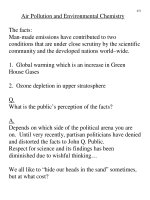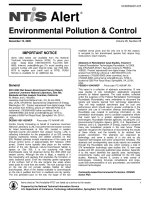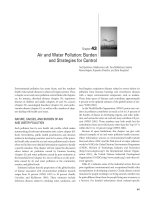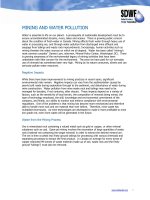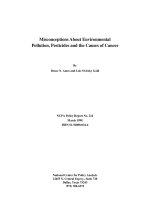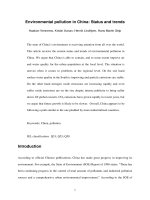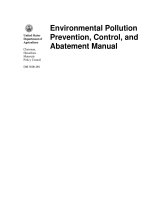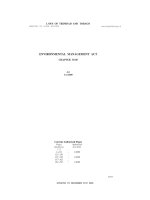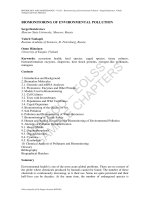Programme title: Soils and Environmental Pollution MSc doc
Bạn đang xem bản rút gọn của tài liệu. Xem và tải ngay bản đầy đủ của tài liệu tại đây (78.52 KB, 7 trang )
Programme title: Soils and Environmental Pollution MSc
For students entering in 2010
Awarding Institution: The University of Reading
Teaching Institution: The University of Reading
Faculty of Science
Programme length: 12 months
Date of specification: July 2010
Programme Director: Dr C.D. Collins
Board of Studies: Dr C.D. Collins,
Professor S. Nortcliff,
Dr Liz Shaw, Prof. M. Bell
Accreditation: None
Summary of programme aims
This M.Sc. aims to provide a thorough understanding of the key principles of Soil Science
which are widely applicable to vocational specialisation in contaminated land, remediation,
environmental assessment, protection and management.
Transferable skills
The following are provided: experience of Information technology, problem solving skills,
research project skills, presentation and writing skills
Programme content
All of the following modules must be completed to qualify for the Masters degree.
Module code
Module title
Credits
Level
Autumn Term
SS2A4
Transport Processes in Soil
10
5
SSMBIO
Soil Microbiology and Biotechnology
10
7
SSMCON
Soil Contaminants
10
7
SSMSD
Short Dissertation
10
7
SSMQAD
Quantitative Analysis of Spatial Data
10
7
SSMTGS
Transferable and generic skills
10
7
Spring Term
SSMPSIA
Practical site investigation
20
7
SSMREM
Remediation
10
7
SSMWEM
Soils, waste and Environmental Management
10
7
SSMSWQ
Soils and Water Quality
10
7
SSMTGS
Transferable and generic skills (continued)
10
7
In break between Spring and Summer terms
SSMFC
Integrated soil science - Field Class
10
7
After 2
nd
set of Exams
SSMRP
Research Project
60
7
Part time / Modular arrangements
Part time participants may either follow all the modules taught in the Autumn term in their
first year and all the modules taught in the Spring term in their second year or alternatively
may follow half the modules from the Autumn and Spring terms in both their first and second
years. The most appropriate arrangements for individual applications will be discussed with
the Course Director. Part time students will be encouraged to consider running a long-term
research project over the two years that they are registered on the course but may carry out
their research project in either their first or second year, again as is appropriate to their
circumstances.
Progression requirements
None
Summary of teaching and assessment
Teaching is through a combination of lectures, seminars, practicals, computer-based self-
taught exercises, site visits and talks by invited speakers.
Assessment is through a combination of exams, assessed practicals, essays, scientific reports
and presentations.
The University’s taught postgraduate marks classification is as follows:
Mark Interpretation
70 – 100% Distinction
60 – 69% Merit
50 – 59% Good standard (Pass)
Failing categories:
40 – 49% Work below threshold standard
0 – 39% Unsatisfactory work
For Masters Degrees
To pass the MSc students must gain an average mark of 50 or more overall including a mark
of 50 or more for the dissertation In addition the total credit value of all modules marked
below 40 must not exceed 30 credits and for all modules marked below 50 must not exceed
55 credits.
Students who gain an average mark of 70 or more overall including a mark of 60 or more for
the dissertation and have no mark below 40 will be eligible for a Distinction. Those gaining
an average mark of 60 or more overall including a mark of 50 or more for the dissertation and
have no mark below 40 will be eligible for a Merit.
For PG Diplomas
To pass the Postgraduate Diploma students must gain an average mark of 50 or more. In
addition the total credit value of all modules marked below 40 must not exceed 30 credits and
for all modules marked below 50 must not exceed 55 credits.
Students who gain an average mark of 70 or more and have no mark below 40 will be eligible
for the award of a Distinction. Those gaining an average mark of 60 or more and have no
mark below 40 will be eligible for a Merit.
For PG Certificate
To pass the Postgraduate Certificate students must gain an average mark of 50 or more. In
addition the total credit value of all modules marked below 40 must not exceed 10 credits.
Normally candidates registered for a diploma will complete the taught courses offered in the
Autumn and Spring terms and candidates registered for a certificate will complete either the
taught courses offered in the Autumn or the Spring term.
Admissions requirement
Entrants to this programme are normally required to have obtained an upper second (2:1) in
an Environmental Science-based degree
Admissions tutor: Dr Chris Collins
All candidates are normally interviewed by two members of staff.
Support for students and their learning
University support for students and their learning falls into two categories. Learning support
includes IT Services, which has several hundred computers, and the University Library,
which across its three sites holds over a million volumes, subscribes to around 4,000 current
periodicals, has a range of electronic sources of information and houses the Student Access to
Independent Learning (S@il) computer-based teaching and learning facilities. There are
language laboratory facilities both for those students studying on a language degree and for
those taking modules offered by the Institution-wide Language Programme.
Student guidance and welfare support is provided by Personal Tutors, School Senior Tutors,
the Students' Union, the Medical Practice and the Student Services Directorate. The Student
Services Directorate is housed in the Carrington Building and includes the Careers Advisory
Service, the Disability Advisory Service, Accommodation Advisory Team, Student Financial
Support, Counselling and Study Advisors. Student Services has a Helpdesk available for
enquiries made in person or online (www.risisweb.reading.ac.uk), or by calling the central
enquiry number on (0118) 378 5555. Students can get key information and guidance from the
team of Helpdesk Advisers, or make an appointment with a specialist adviser; Student
Services also offer drop-in sessions on everything from accommodation to finance. The
Carrington Building is open between 8:30 and 17:30 Monday to Thursday (17:00 Friday and
during vacation periods). Further information can be found in the Student website
(www.reading.ac.uk/student).
Career prospects
On completion of this course graduates may expect to find employment in the
“Environmental Sector”. Previous students on the course have found employment with
consultancies, government research agencies, industry and within academia
Opportunities for study abroad or for placements
During their research projects students may carry out field work abroad. Additionally during
their projects students may be based abroad or within the UK at consultancies, governmental
agencies, research institutes or industrial bodies provided that the Course Director is satisfied
that suitable facilities and supervision are available to them.
Educational aims of the programme
This M.Sc. aims to provide a thorough understanding of the key principles of Soil Science
which are widely applicable to vocational specialisation in contaminated land, remediation,
environmental assessment, protection and management. The course will provide the students
with the intellectual skills required by professionals in environmental consultancy,
contaminated land management and land remediation. Graduates from the course will have
an in-depth knowledge of the chemical, physical and biological principles of Soil Science,
experience of the major types of soil contamination, familiarity with regulatory and
commercial aspects of contaminated land and land management and problem solving skills in
relation to soil management and remediation.
Programme Outcomes
Knowledge and Understanding
A. Knowledge and understanding of:
Teaching / learning methods and strategies
1. Processes by which water and dissolved
solutes are transported in soils using
physical principles
2. The important chemical properties of
soils, including the reasons for and
consequences of the electrically charged
surfaces of most soil constituents
3. Geographic information systems
4. A general understanding of the pathways
of soil contamination
5. The most important groups of inorganic
and organic pollutants and chemical
properties and processes which govern their
environmental fate
6. The major groups of micro-organisms in
soils and their role in the cycling of C, N, P
and S and their use in bioremediation
7. Classical and bespoke statistical methods
that may be applied to environmental data
8. Key areas of environmental law and
regulation in England and Wales
9. Techniques and processes involved in
site investigation and risk assessment
10. Strategies and objectives of remediation
11. Sources, processing and disposal of
waste materials
12. The behaviour of pollutants in soil,
losses into water and current method of
management to reduce the associated
environmental hazards
Lectures, laboratory practicals, seminars,
group discussions, videos, presentations by
industrial practitioners, data handling
exercises, computer based exercises
Assessment
Practical reports, examination, essays,
computer and laboratory-based practicals
Skills and other attributes
B. Intellectual skills – able to:
Teaching / learning methods and strategies
1. Predict water and solute transport in
soils using physical principles
2. Recognise and explain the important
chemical properties of soils
3. Understand controls on mobility and
availability of pollutants in soils
4. Outline the importance of micro-
organisms in soil systems and their
impact on the wider environment
5. Discuss key areas of environmental
law and regulation in England and
Wales including the impact of EU law
6. Compare and advocate remediation
strategies
7. Illustrate sources of and disposal
routes for industrial and domestic waste
8. Plan and carry out a research project
Lectures, laboratory and computer based
practicals
Assessment
Exams (1 – 7), essays (2 – 4) , presentations (2,
3), computer practicals (1), written reports (5 –
7), project thesis and presentation (8)
These skills link directly to specific modules
and are assessed both during courses (see
module descriptions for details) and in
examinations.
C. Practical skills – able to:
Teaching / learning methods and strategies
1. Use computer packages to
analysis and explain field data
2. Carry out chemical analysis
of soils
3. Calculate toxic and
acceptable concentrations of
pollutants in soils
4. Isolate and characterise
micro-organisms in soils and
measure their activity
5. Analyse environmental data
using classical and spatial
statistical methods
6. Carry out risk assessments
and site investigations
7. Describe soils in the field
8. Plan and carry out a research
project
Laboratory practicals, seminars, lectures, independent
research project
Assessment
Laboratory reports (1, 2, 4, 5), reports in the style of
those given to clients (6), exams (3), field reports (7),
project thesis and presentation (8)
These skills are assessed primarily with reference to
specific modules (see module descriptions for details)
though (1) is also assessed more generally throughout
the course.
D. Transferable skills – able to:
Teaching / learning methods and strategies
1. Produce Word documents
containing tables, numbered and
bulleted lists, a variety of fonts,
graphics and pictures
2. Sort data and perform basic
arithmetic and statistical
procedures within Excel
3. Produce charts and graphs in a
variety of formats using Excel
4. Produce slides for a presentation
within the PowerPoint package
that include text, bullet points,
drawings, use of pre-set
animations for the appearance of
text
5. Give clear presentations on a
scientific topic
6. Produce clearly written
scientific reports
7. Work in teams
8. Plan and carry out research
projects including managing their
time in an efficient fashion
Lectures, self-taught computer packages, seminars,
individual research projects, team-based
presentations and research projects
Assessment
Ability to produce specimen Word documents (1),
Excel charts (2, 3) and PowerPoint presentations (4),
course work written and submitted in the style of
scientific reports to a client (5, 6), peer-assessed
contribution to team-based practicals (7), project
thesis and presentation (5, 6, 8)
This assessment is carried out directly (see module
description dealing with transferable and generic
skills) and indirectly throughout the course and forms
a component of assessed course work.
Please note - This specification provides a concise summary of the main features of the
programme and the learning outcomes that a typical student might reasonably be expected to
achieve and demonstrate if he/she takes full advantage of the learning opportunities that are
provided. More detailed information on the learning outcomes, content and teaching, learning
and assessment methods of each module can be found in the module description and in the
programme handbook. The University reserves the right to modify this specification in
unforeseen circumstances, or where the process of academic development and feedback from
students, quality assurance processes or external sources, such as professional bodies, requires a
change to be made. In such circumstances, a revised specification will be issued.
